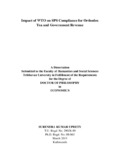Please use this identifier to cite or link to this item:
http://archive.nnl.gov.np:8080/handle/123456789/126| Title: | Impact of WTO on SPS compliance for orthodox tea and government revenue |
| Authors: | Uprety, Surendra Kumar |
| Keywords: | Orthodox tea Government revenue WTO SPS compliance |
| Issue Date: | 1-Jun-2018 |
| Abstract: | When liberalization has been emerged as a functioning framework in the economy, it has very often attributed some far reaching implications especially for the economies of developing and the least developed countries in two crucially important external economic domains (in international trade), i. e., in exports and in imports although foreign direct investment (FDI), and labor mobility are also some important domains. However, the contemporary history of international trade witnesses a marked progress in lowering barriers to trade, particularly the tariffs over the last six decades, the practice of non-tariff barriers has widely been adopted. These measures have resulted in the World Trade Organization (WTO) agreements in Technical Barriers to Trade and Sanitary and Phytosanitary (SPS) regulations. With the world-wide reduction in tariffs under the auspices of the General Agreement on Trade and Tariff (GATT)/WTO standards and, more generally, non-tariff measures have further gained importance in the world trade. This trend also reflects the growing concerns over product quality and consumer health and safety. As this quality compliances of exportable commodities, within the SPS framework, involve significant costs, producers and exporters of these countries face severe difficulties due to their weak competitive strength. On the other hand, these countries also have to face revenue loss, specially the trade tax revenue, from import due to reduced tariffs regime, because of the agreements in non agricultural market access framework of WTO. This implication is very important because many developing and low income countries governments' revenues are hugely supported by custom duties. Therefore, a country has to bear the dual costs of compliance – both in export (the SPS quality compliance costs) and in import (revenue loss resulted from reduced tariff regime within trade liberalization framework) – to be benefitted from the WTO and economic liberalization. This dissertation measures the cost of SPS compliance of Nepalese highland orthodox tea as the case study on the basis of ISO: 22000 applying double log linear regression model. Based on the survey of primary data as per the ISO: 22000 compliance components, this study finds that there is a significant additional cost incurred (average 44.86%: Small Scale 57.24%; Medium Scale 45.10%; and Large scale 42.38%) to comply with the stringent SPS specifications. Likewise, another aspect of the implication attributed by economic liberalization and hence in the WTO framework is revenue impact on the government. It basically addresses the tariff revenue concerns that Nepal has been responding in the context of the current multilateral trade negotiations under the Doha Development Agenda. This study thus analyzes the revenue impact with reference to Nepal's time series macroeconomic data of 1974-75 to 2010-11 by comparing the pre- and post-liberalization periods applying Phillips-Hansen Fully Modified Ordinary Least Squares Model coupled with Error Correction Modeling of co-integration method. The results of the analysis indicate that the impacts of trade liberalization measures on the government revenues are not found to be significant in most of the cases. But, Nepalese economy has become more open in the post-liberalization period as the trend of openness indexes reveals increasing trade to GDP ratio and decreasing trade tax to import ratio. |
| Description: | A dissertation submitted to the faculty of Humanities and Social Sciences, Tribhuvan University in fulfillment of the requirements for the degree of Doctor of philosophy in Economics, 2013. |
| URI: | http://103.69.125.248:8080/xmlui/handle/123456789/126 |
| Appears in Collections: | 300 Social sciences |
Files in This Item:
| File | Description | Size | Format | |
|---|---|---|---|---|
| 85-Dr. Surendra Kumar Uprety,.pdf | 3.24 MB | Adobe PDF |  View/Open |
Items in DSpace are protected by copyright, with all rights reserved, unless otherwise indicated.